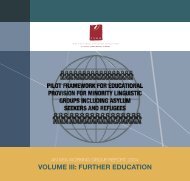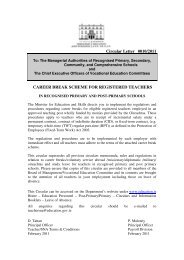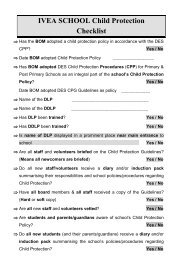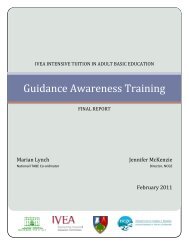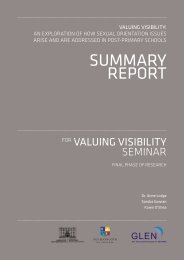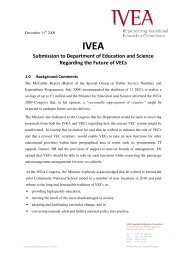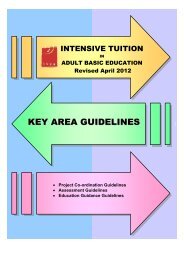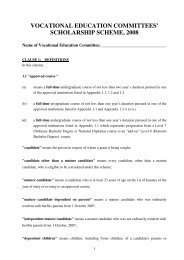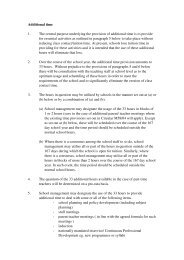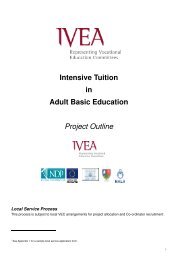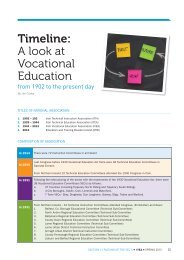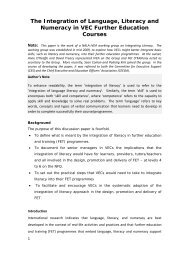Download File - IVEA
Download File - IVEA
Download File - IVEA
Create successful ePaper yourself
Turn your PDF publications into a flip-book with our unique Google optimized e-Paper software.
model of language support and bilingual/multilingual children are<br />
referred to as ‘non-English speaking’ and ‘non-national’ 22 .<br />
3.6 RESEARCH AND DEVELOPMENT<br />
WITHIN THE VEC SECTOR<br />
Several VECs have been involved in research on the education and<br />
language needs of refugees, asylum seekers and other minority<br />
linguistic groups since 2001. The White Paper on Adult Education,<br />
Learning for Life, (2000) made adult asylum seekers eligible for<br />
language and literacy support through the VECs and recommended<br />
that a study be undertaken on their language needs. The City of<br />
Dublin VEC, in association with County Dublin VEC, initiated a major<br />
research project on adult asylum seekers in response. Researched<br />
and written by Tanya Ward, the report was entitled- Asylum Seekers<br />
in Adult Education: A Study of Language and Literacy Needs<br />
(2002). Considering provision for asylum seekers holistically, this<br />
research stresses that language/literacy issues are inextricably linked<br />
to equality and interculturalism. The research advocates a learnercentred<br />
and needs-based approach for the delivery of programmes<br />
through a mainstream State adult education service. Written from<br />
a gendered perspective, particular attention is paid to survivors of<br />
torture and people with disabilities.<br />
During the research, separated children (refer to sections 7.3 & 7.4)<br />
were identified as experiencing immense difficulties accessing and<br />
remaining in education. Supported by the Department of Education<br />
and Science and working in collaboration, the City of Dublin VEC,<br />
County Dublin VEC and Dun Laoghaire VEC initiated a research<br />
project on the education/language needs of separated children in<br />
2001. The project aims to compile a profile of separated children<br />
living in Dublin and evaluate current educational provision, paying<br />
particular attention to: equality and anti-discrimination; reception<br />
and orientation; supporting bilingual/multilingual students in schools;<br />
teaching materials; school attendance; guidance; and student<br />
supports. The Dublin-based VECs will publish this research in 2004.<br />
The City of Dublin VEC and County Dublin VEC have also published<br />
another report entitled: Immigration and Residency in Ireland:<br />
An Overview for Education Providers (2003). Providing up-to-date<br />
information and statistics, this document outlines the social/economic<br />
rights that pertain to each immigrant group residing in Ireland.<br />
This document was widely distributed to all other VECs.<br />
The Dublin based VECs record of research in this area indicates<br />
that with adequate funding, VECs can draw on expertise within their<br />
organisations and be at the forefront of research and development.<br />
The work of the CDVEC in educational provision and research for<br />
asylum seekers, refugees and, in particular, separated children was<br />
recognised by the United Nations High Commissioner for Refugees<br />
(UNHCR) when it received a Certificate of Recognition in June<br />
2003. This is only the second time an Irish based organisation was<br />
presented with this award.<br />
A pilot action research project was undertaken by the CDVEC<br />
Curriculum Development Unit between January 2002 – January<br />
2003 to examine the effectiveness of using a whole-school approach<br />
in developing intercultural and inclusive policy and practice within<br />
schools 23 .<br />
The project aimed to encourage and support schools in developing<br />
inclusive, intercultural policies and practice on a whole-school<br />
basis, and to develop a model of a whole school approach to<br />
interculturalism and anti-racism which could be used by all schools.<br />
The project found that a whole school approach to interculturalism<br />
offers schools a real and significant means of facilitating the equal<br />
access and participation of students from all ethnic backgrounds in<br />
the education process.<br />
It recommended that a whole school approach to interculturalism<br />
and anti-racism should be adopted by all education centres and<br />
that training and awareness in interculturalism and anti-racism<br />
should be provided for all members of a school community, both as<br />
a prerequisite part of intercultural policy development and as part<br />
of ongoing school development and review. Essential components<br />
of this training should be exploration of attitudes, values and<br />
understandings of the concepts of interculturalism and anti-racism.<br />
The CDVEC Curriculum Development Unit also carried out a<br />
consultation process on behalf of the DES in order to prepare<br />
recommendations for the National Action Plan against Racism.<br />
The report of the consultation findings and the resulting<br />
recommendations are contained in the report Promoting Anti-racism<br />
and Interculturalism in Education: Recommendations towards a<br />
National Action Plan (DES: 2003).<br />
14<br />
22<br />
See for example, IILT English language proficiency benchmarks for non-English speaking pupils at post-primary IILT, Dublin: 2001 and IILT Learning the Language of the Host Community: Language Assessment Guidelines for<br />
Teachers of non-English speaking non-national pupils in post-primary schools IILT, Dublin: 2001.<br />
23<br />
Funding for the project was received from the European Refugee Fund, Ireland Aid and the In-Career Development Unit, Department of Education and Science.



